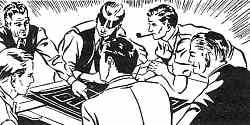|
Our third horseman of Peace is Experience. We have learned many things in this War - some goodsome bad. But when we approach Peace there is one thing that will stand out prominently.  A country which, in the short space of a couple of years, can convert from almost a hundred per cent commercial nation into the World's greatest military power must have some asset of tremendous value. This is the "know how" of the manufacturing world - but outside of this group it would probably be labelled "experience and good judgment." And when the day comes to again beat our swords into ploughshares, this horseman of Experience will be there showing us how to do it. The last of the writer's horsemen of Peace is Science. In reality he actually leads the way. Although the march of science has been slowed by the Four Ancient Horsemen, Science in return has made these destructive riders much less effective and ghastly. Not so many new things have come out of this War as new ways of using some of the old ones. We have learned many things about medicine, fuels, foods, the weather, airplanes, radio - and people. With the coming of Peace we can use this knowledge to help uncover new facts and new ways of building a better civilization. |








